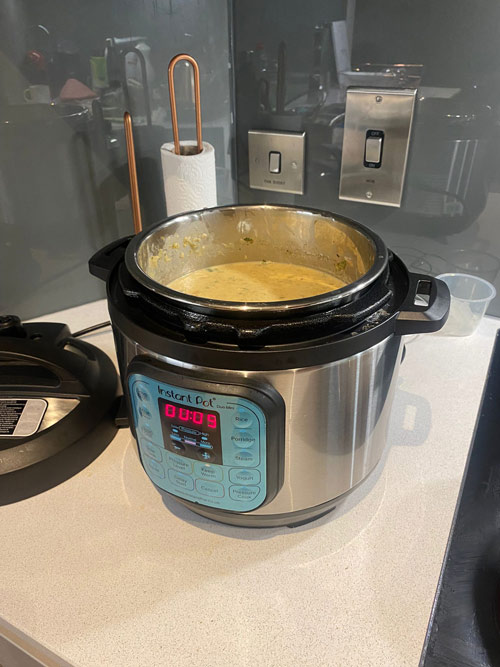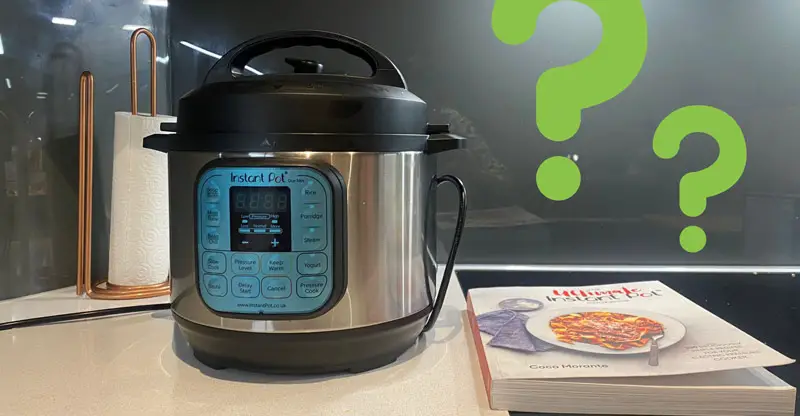I personally love new cooking gadgets. I am an avid user of my Philips air fryer, and also a dedicated user of my Instant Pot.
The Instant Pot is a millennial phenomenon, and I’ve totally bought into it. The appliance condenses what would otherwise be a 10-hour cooking stint, down to about 30 minutes (depending on what you’re cooking, of course!).
One of my main worries when I first started cooking with the Instant Pot was the sometimes alarming hissing sound I would tend to hear from time to time.
The hissing while using an Instant Pot is normal. It simply means that the pressure inside is high. Instant Pots are specially equipped to deal with this, and their lids feature a valve that moves in order to release the pressure inside the cooker.
In other words the hissing sound is a welcoming characteristic, not a flaw, of your Instant Pot.
Keep on reading to learn more about other Instant Pot quirks and what to do when they arise.
What’s the Big Deal Anyway?
You may have been wanting an Instant Pot for quite some time now. Internet influencers show them as an essential part of their weekly meal prep routines.
With so many people working from home for the last few years, their trendiness has skyrocketed along with the infamous air fryer.
Quick Cooking Times
Instant Pots are nifty kitchen appliances. These multifaceted electric pressure cookers — like the name suggests — work quickly!
In fact, pressure cooking is around 70% faster than regular cooking.
Energy Efficient
Instant Pots are highly energy efficient. They are tightly sealed and use drastically much less energy than boiling water or cooking in an oven.
Air fryers are also energy efficient kitchen appliances because of their small stature and condensed way of cooking food.
Check out the latest price for this Instant Pot on Amazon now.
Instant Pot Quick View Chart
We’ve supplied a quick view charts for you below, so you can glean the best and worst Instant Pot characteristics.
Pros
Cons
Related: Top Pressure Cooker Recipes for a Healthy Day
Sounds Coming From Your Instant Pot
Since the device is so versatile, there are bound to be a few noises arising.
Some of the sounds you may hear include:
Hissing
The very focal point of this article. Hissing is absolutely normal coming from the Instant Pot.
If the hissing is persistent then it could mean that the Instant Pot is not reaching the correct internal pressure to cook food. Instant Pots are fully equipped and enegineered to handle hissing and pressure changes.
You will want to keep an ear out for the hissing to ensure it is there, but not too much. Check to be sure the valve is set to “sealing” not “venting.”
If the Instant Pot continues to hiss for a long time, then it is time to troubleshoot. This may signal an issue with the sealing valve of the kitchen device. Food will not cook due to low pressure levels inside the chamber, should this be the case.
Outcome: Normal
Rattling
This is a troubling sound. Instant Pots don’t normally shake or rattle when they are functioning. This normally signifies that there is too much pressure inside.
If rattling starts to happen, the best thing to do is to turn the Instant Pot off.
Outcome: Not Normal
Beeping
One single beep is normal, but a persistent beeping noise signals a problem. This means that the Instant Pot is overheating.
Again, the best thing you can do is turn the Instant Pot off.
Outcome: Both Normal and Not Normal
You may also like: Can You Leave Cooked Chicken in the Fridge for 7 Days?
Troubleshooting Your Instant Pot

Instant Pot sautéing food
There are a couple of sure-fire ways or “hacks” to revert to when you sense something is amiss with your Instant Pot.
Remember that hissing is just part of what Instant Pots do. Furthermore, electric pressure cookers are the quietest because they can accommodate high pressure.
Solution #1: Purchase an Instant Pot Cookbook
Cookbooks are great ways to gauge whether or not something is “normal” with your cooking appliance.
With the step-by-step instructions, it is hard to make a mistake! Check out this Instant Pot cookbook on Amazon. When you have a cookbook to follow, working the appliance gets easier.
Safety tip:
It is not advisable to leave your home when using your Instant Pot. If you do need to leave, wait until the Instant Pot has reached the correct pressure.
Solution #2: Clean Your Instant Pot Regularly
Another way to ensure your Instant Pot functions well and doesn’t make troublesome noises is to clean it thoroughly from time to time.
While cleaning, check the valve and the seal to ensure all is well. You can make cleaning fun by thinking of it as an Instant Pot check up!
Solution #3: Reset the Instant Pot
If things still seem out of ordinary, you can reset the Instant Pot back to factory settings.
This is fairly easy and all you will need to do is:
- Ensure the Instant Pot is “off”
- Press and hold down the “adjust” button
- Hold the button for three seconds
You can find more Instant Pot feature updates on the Instant Pot website.
Check out: Air Fryer VS Microwave [With Handy Comparison Charts]
A Quick Step by Step Tutorial
I will take you step by step on how to use your Instant Pot. I’ve used mine to make countless meals like paella, white chicken chili, bigos, and even a delicious chicken and fig curry.
Step 1: Prime Your Instant Pot
If you’re anything like me, I tend to rush cleaning my kitchen after I cook. This unfortunately means my kitchen appliances are often neglected!
Before using your Instant Pot, it is a good idea to wipe it down and clean it from any grease or oil.
Step 2: Add Your Food
The key to cooking with an Instant Pot is that there needs to be liquid inside. Whatever recipe you decide to cook, keep in mind that if there is no water there is no steam and therefore no pressure.
Step 3: Lock the Lid and Check the Valve
Once all the ingredients are inside the pot, it is time to lock the lid. This is really easy, simply put the lid on and turn it clockwise until you feel it lock.
Afterward, point the valve toward the “sealing” position. If the valve is pointing toward the “venting” position, then the Instant Pot will not come to pressure.
Step 4: Choose Your Setting and Wait
Different models of the Instant Pot have different settings. Just recently I made white chicken chili. For this recipe the setting I selected was “Bean / Chili,” which means the food cooked at a high pressure for 30 minutes.
After the meal cooks, and your Instant Pot makes a beep (not an alarming persistent beeping noise, mind you!) then you will need to release the pressure.
Put these oven mittens on, and shift the valve over to release the steam.
Step 5: Enjoy Your Meal!

Delicious white chicken chili with rice made from my Instant Pot
Give the food a stir, serve, and then enjoy!
Remember that when using an Instant Pot, you must add liquid. When I have cooked meals in the past, I found myself adding too much stock. The Instant Pot doesn’t evaporate liquid so anything you add in at the beginning will mostly remain.
Instant Pot Tip:
If you find you have added too much liquid to your meal then you can always select the “Saute” setting to reduce it down.
Conclusion
Instant Pots are ingenious little appliances. Upon first using one, I found it a tad difficult. Yet, after a few rounds of cooking I became more comfortable experimenting with settings and creating new and delicious meals.
You may find that the Instant Pot makes hissing noises. In most cases this is absolutely normal because this signals that the pressure needs releasing. Instant Pots are specifically designed to do this at the end of the cooking cycle.
Any prolonged hissing noise, rattling, or incessant beeping could signal an issue. To best deal with this, turn off the Instant Pot, check the manual, and remember to not take the top off.
Cooking with an Instant Pot does take some time to master, but once you do the benefits definitely compound!
- Can You Use Aluminum Foil in the Air Fryer? [Five Tips & Tricks] - January 23, 2024
- How to Cook Frozen Onion Rings in the Philips Air Fryer [Step By Step] - July 20, 2023
- Why Does My Philips Air Fryer Keep Turning Off? [Solutions & More!] - June 8, 2023
Last update on 2025-04-27 / Affiliate links / Images from Amazon Product Advertising API


